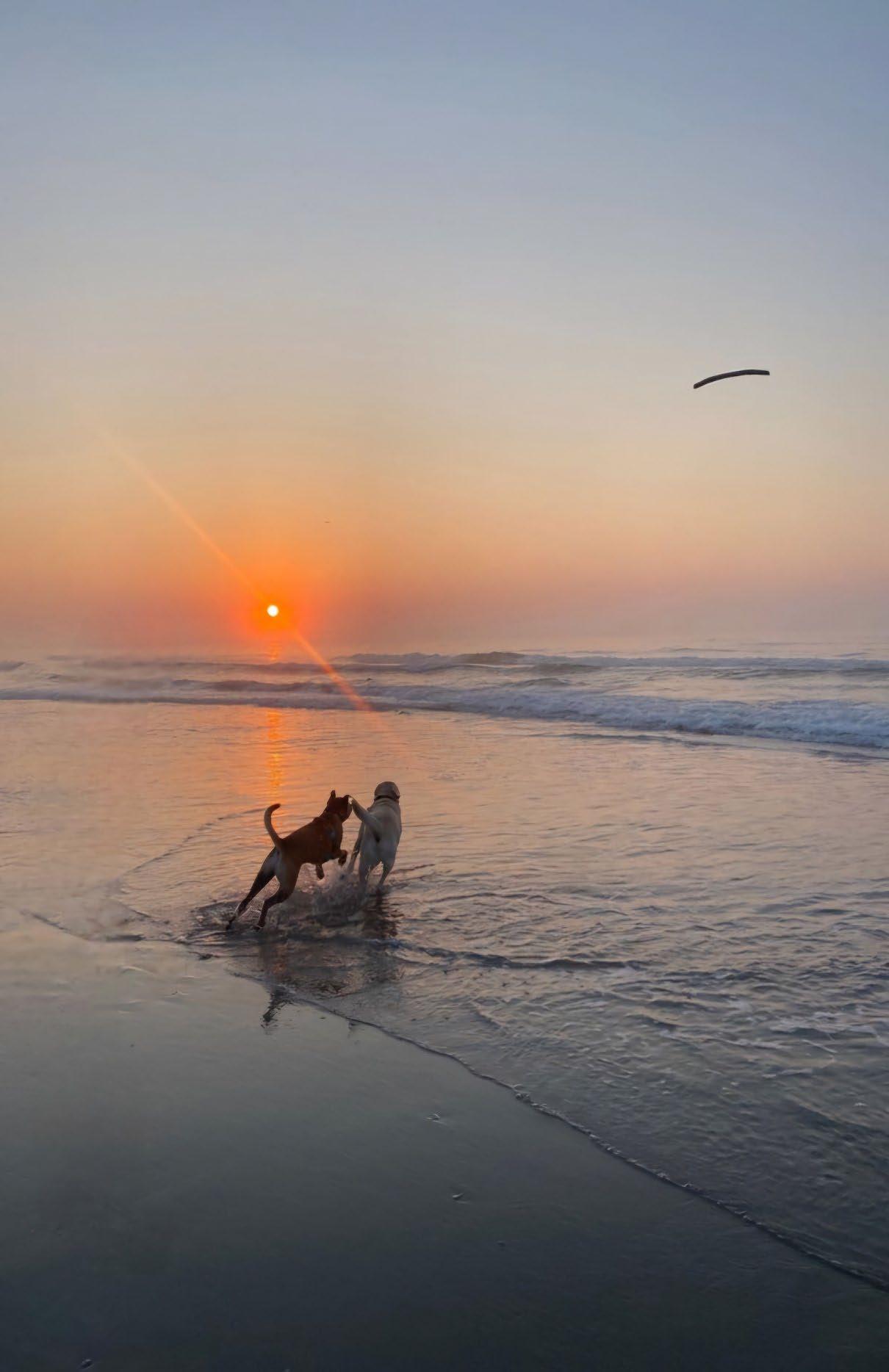

DAMOZEL
The Literary Magazine of Notre Dame of Maryland University 2024-2025
Damozel Staff 2024-2025
Literary Editors:
Holly Hand ’25
Chelsea Martin ’25
Hailey Guerrier ’26
Kameron Woodrum ’27
Amanda Grant ’28
Alumna Editor:
Katie Cardinal ‘20
Mission Statement
Founded in 1932, Damozel is Notre Dame of Maryland University’s student-run literary magazine. Published annually, Damozel showcases creative writing, art, and photography by current NDMU students and alumni.
Our mission is to provide a platform for artistic expression and literary exploration within the Notre Dame community. Each issue highlights a diverse collection of work, celebrating the creativity of our contributors.
The 2024-2025 issue of Damozel was compiled and edited with dedication and care, continuing the tradition of excellence in studentled publishing.
Thoughts From a Balcony
To be loved by you
Is the closest a human will get to experiencing the warm embrace of God
I will never be this gently embraced by another
Nor will I ever embrace another with the same tenderness in which I hold you
How could I when I know what it is to be held by a deity?
I weep prematurely for the day you depart from me “Please don’t go where I can’t follow”
A plea that echoes from the darkest corners of my mind
My love cracks my chest open for all to see A chasm marked by the depth of my emotions
How vulnerable and humiliating It is to love and be loved
Chelsea Martin ’25, English

Blazing Orange
Summara Abaid ’17, Biology
When Planets Collide
When planets collide, will our love survive?
In the chaos, in the void, will it keep us alive?
When the light fades and shadows confide, Will our love still guide the blind?
When our bodies return to the ground, Will our love’s echo help our souls be found? When time halts its endless stream, Will our love endure, eternal as a dream?
When stars collapse and the heavens break, Will our love rise for its own sake?
When all creation meets its end, Will our love transcend, unbroken to the end?
When the last winds fade and silence grows, Will our love still burn, a light that glows?
Malaak Ahmad ’25, Nursing
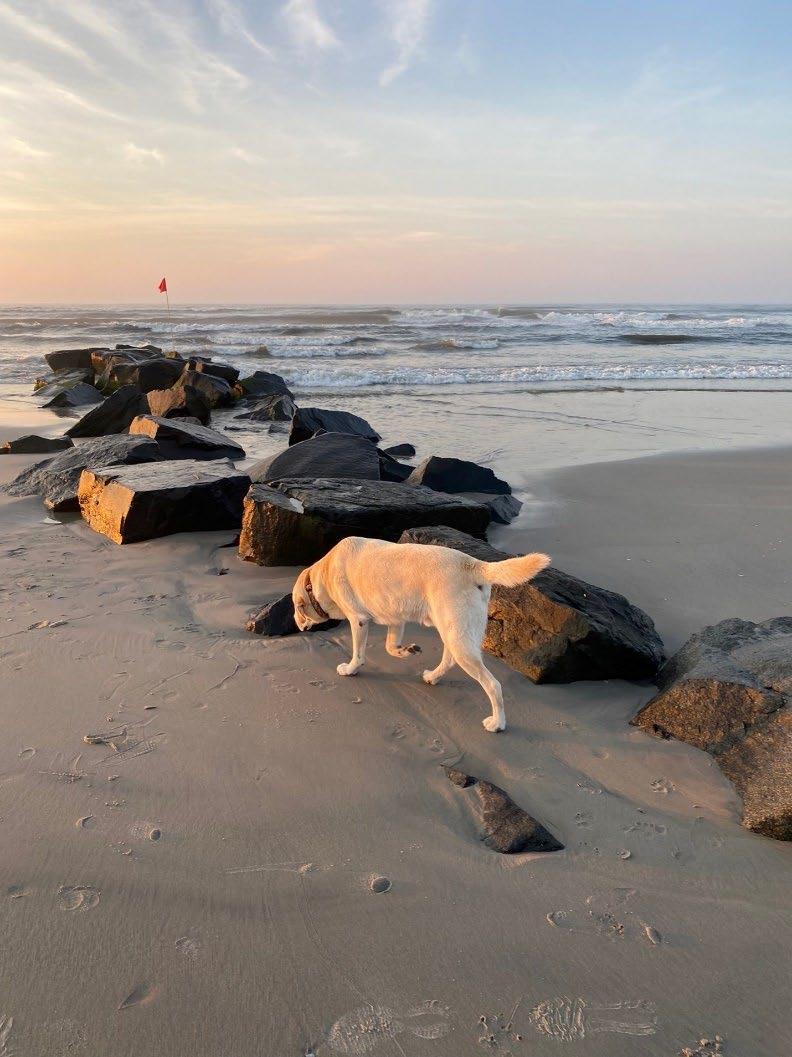
Dog at Sunset
Holly Hand ’25, English
My Dearest Son
For every ache, I was the balm, For every fuss, I was the calm. In every dark, I was your light, In every fall, I gave you flight.
Fly now, my little bird, soar high, But pause to rest as you pass by Find strength and peace, and lean on me, Your steadfast trunk, your giving tree.
Sebiha Basar ‘24, Elementary/Early Childhood Education

Peeking Through
Eliza Davis ’25, History & Political Science
We Used to Get Haircuts Together
Twenty-two years.
We used to get haircuts together. It started sitting on the kitchen counter over the sink but when elementary school days came, they’d take us to the salon next to the bagel shop in town. Now I have to call a few days ahead of time if I want to see you when I come home.
We used to beg our home room teachers to switch us into the same classes each year. Now six months later you tell me you failed statistics.
We spent every night after school on that trampoline. Chatting, playing catch over the net, and sleeping on warm nights. Last time I passed it, the nylon was dry rotted, and the springs have started to rust.
Our childhood artwork still on display now sits sun bleached and dusty from the years in the window light. I’m thrilled it’s been allowed to age with us.
I remember when we built the tree fort. We used scrap wood from when the deck was built, and it was so not up to a single building code, but we’d hide under the shade of the wood and play. Last bonfire we had I watched the rotted wood get tossed in. Our scratches and drawings from over the years burned away in a matter of seconds.
I think of you every time it snows. I always feel a little excited we may have a snow day to play outside together but then I remember we are in our twenties and there are no snow days or sledding down the front hill in college.
I see our faces in the kids waiting for the bus together in the mornings. I feel my face and hands freeze along with them because nobody at that age would be willing to wear a hat and gloves. They are just as stubborn as we were.
This May we are going to graduate from college. We will finally be in the same place again. I would have never agreed to grow up if it meant growing out of you but maybe we can go get our hair cut together again.
Holly Hand ’25, English

Solitude
Summara Abaid ’17, Biology
Marilyn Goes to the Movies
After Marilyn 31 by Andy Warhol (USA, 1967)
Mama named me Norma Jeane but then decided she spelled it wrong so baptism washed that second e from my skin with my original sin.
When Mama’s voices drove her all the way to an institution I bounced between homes like each bed was a trampoline and my body could never settle.
But in front of the silver screen I finally found stillness.
I wore other people’s stories like the security Mama never gave me and I swore my face would be up there one day, shining down like moonlight on the cheeks of another lonely girl searching for loose change in the empty theater after the credits roll so she can buy another hour or two to help her forget there’s no home to go home to.
Gabby Gilliam ’24, Leadership in Teaching (M.A.)
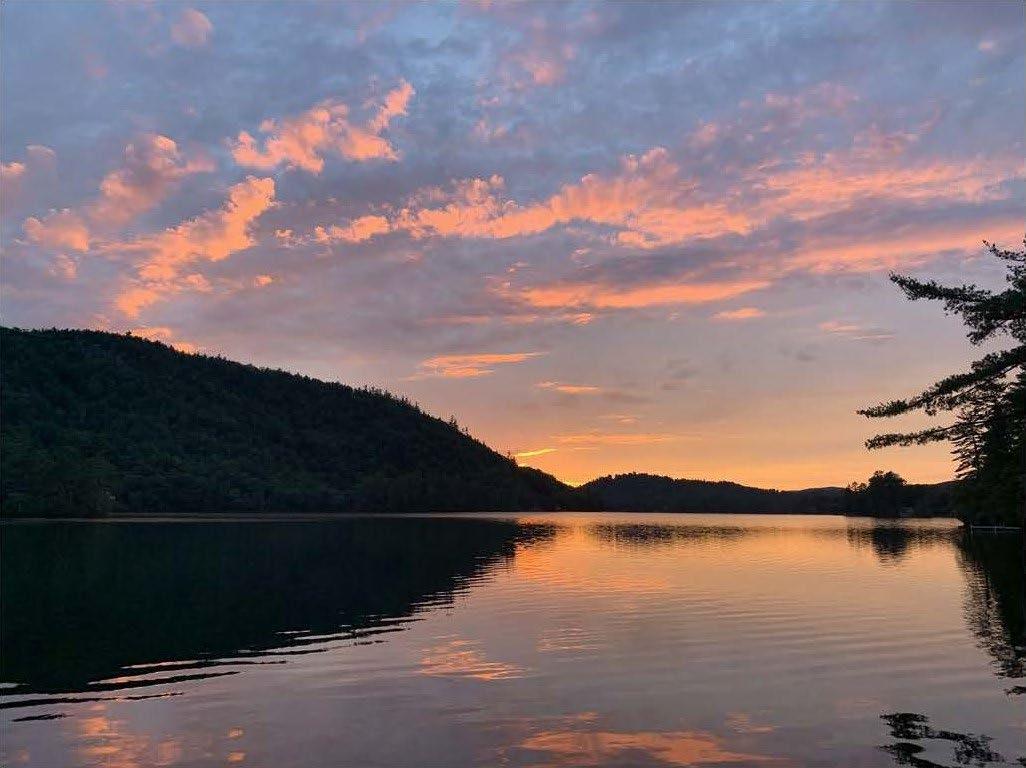
Untitled Carter Nocca ’28, Health Sciences
Serenity
None have stretched the capacities of my mind I have been brought down closer to the earth with her bright green shoots of grass blazing beneath the sizzling sun a yellow orb queen of the soft blue sky like a mother tending her children the trees stretch limbs twisting reaching for her nourishment the way a baby bird cranes its neck when the mother sparrow perches on the edge of a twig nest worm stretching wiggling
Jeannine Stanko ’28, Instructional Leadership for Changing Populations (Ph.D)

Summara Abaid ’17, Biology
Purple Veins
I’m Afraid of Being Messy
I want everything I present to be cohesive and tidy
Everything is prepared or rehearsed
This leaves no room for spontaneity, and limited authenticity
I spend too much time crafting my next sentence
I agonize over every word and anxiously wait for feedback
All I have to offer are my words
I one day hope to be brave enough to be messy
To have a collection of notebooks filled with muddled thoughts
To scrawl out ideas on napkins and scraps of paper before it escapes my mind
To not check the spelling of a word before committing it to paper
To record thoughts as they are rather than edit them to fit a narrative I’ve mentally created
They are there just to exist outside of my head
I am not there yet
It took me two hours to write these 14 lines, but one day the words will flow from me naturally
But for now, I struggle with figuring out how to end this poem
Chelsea Martin ’25, English

Repeating Patterns
Summara Abaid ’17, Biology
Lessons Learned
When were you going to say it was enough?
You and I knew, but I was too young. How could I have known those words had meaning, When it was too late I was starting to feel it?
My body broke down, it shattered in pieces, Scraping up scraps of me, trapped in the deep end. I figure this is all so bittersweet The time you stole from me; at least that's how it seems
You run to those who are broken: There are no lies to unfold, no words to be spoken There’s nothing more that I could do I know that now because I know you
Spirit
Jones ’28, Nursing

Surface Level Depth
Zoe Kumpf ’25, Art Therapy
Motherhood
Sleepless nights
Washing my face
But with hand soap
Endless bottles to clean
Packing lunches at night with no end in sight
The screaming
The crying
The worrying
The constant rushing out the door
The laundry mountains
The kitchen sink swamp
The cold, lost and forgotten coffee that is so desperately my life line
I would do it all again
to watch you paint with watercolors
And to wish on dandelions seeds
To stomp in puddles
And dig for worms
To admire the moon and stars
Even on a cold, dark night
For I am building your foundation
Where is it ok
To feel
To question
To dream
To know what it means to love and to be loved
Julia Taylor ’13, Studio Art & Education
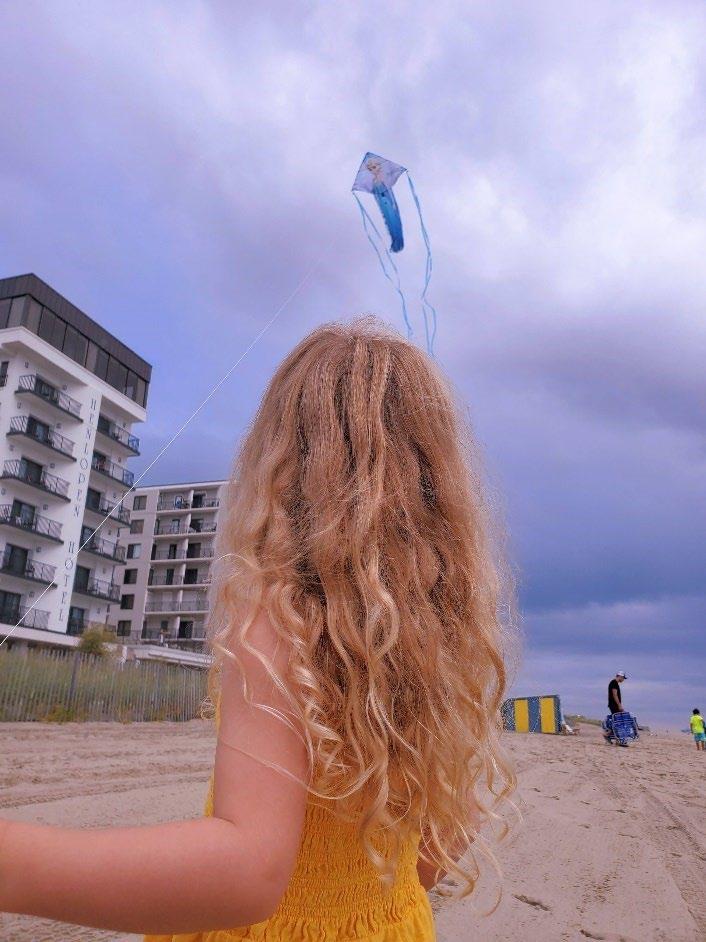
V at the Henlopen
Kelly Boyd ’17, English Literature (M.A.)
Maeve
Every year.
I miss my campers.
I’ll never admit I have favorites. Though I miss certain ones a little extra. You have wormed your way into the one I miss the most.
My mornings are less special when you don’t get off the bus smiling ready to show me your outfit.
Nobody holds my hand and tells me “You’re my absolute favoritest.”
Even if they did it’s not as special if it’s not coming from you. I am certainly aware you are not always an angel.
I have the bite marks and bruises to prove it.
And I haven’t forgotten the time you made us chase you across the road and laughed the whole time.
But nothing’s that serious when you are only four.
I don’t even mind the multiple walkie talkie calls a day when you are acting feral or throwing a tantrum. It makes me laugh while I have to rush to whatever poor counselor you are terrorizing.
Ingrained in my memory is the day your brother came to camp. He had a break in treatment. You mom had briefed me all week. I was ready.
You helped me and remind me what he needed. You checked in on him and how he was feeling. You were so caviler telling me about your brother’s prognosis. You knew it wasn’t good.
At four years old you understood. I cried in my car that day after camp.
I couldn’t imagine doing that for my brother. Your mom texted me that night that he had the best time and that he felt well enough to come the next day too. He came every day that week.
My heart hurt each time your mom would tell me that he could do whatever he wanted.
She called it “His last hurrah.”
I feel so frustrated when they say angrily that you act out on purpose And you’re doing it for attention. You are only four, with the weight of mortality on your tiny shoulders.
So, I really don’t mind when you act out. You can have all the attention you crave. You are my favorite shadow.
Holly Hand ’25, English
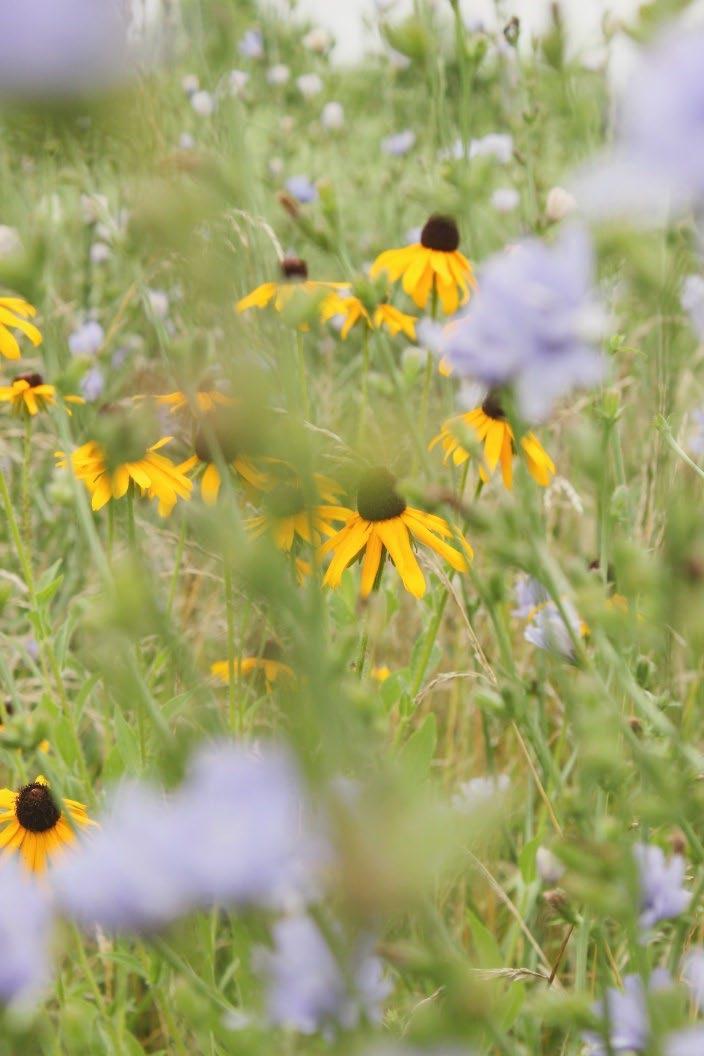
Meadowlark
Zoe Kumpf ’25, Art Therapy
Untitled
The earth completes another seventy-year waltz around the sun. Her body bears the imprints of time’s tender yet relentless embrace, Yet her soul pirouettes among the bees once more. That’s all that matters to her.
She never wishes for the sun to extinguish or the moon to fade, For she basks in their radiant luminescence.
“Simple,” she murmurs,
But simplicity whispers and exudes peace, Allowing her to hear the birds’ serenades, Her grandchildren’s laughter, The bees’ hum, comforting her fields of oats and trees.
Butterflies envelop her, their delicate wings bestowing gentle, buttery kisses,
Reminding her of a legacy woven with peace and love, embedded in her very bones.
Her body, her essence she hopes will one day nourish these fields, Sustaining the souls yet to come.
Thus, she tends to herself, preparing to become one with the earth Ensuring a bountiful harvest of love and warmth.
She knows her spirit will ascend, joining the night sky, Shining brightly to protect and guide those who cannot see her, But who cherish her memory, Living in peace and harmony upon God’s greatest creation, Where humanity may flourish.
Raechel
Bauer ’26, Nursing

Untitled Carter Nocca ’28, Health Sciences

Is this peaceful?
Zoe Kumpf ’25, Art Therapy
Ants (The Weight of Love)
Ants can lift up to 50 times their weight
I would carry your weight with me
Long after my legs have cramped
And my knees buckled
And even after my body has collapsed under our shared mass
But I would still carry you
If that meant I’d have you with me forever
Martin ’25, English
Chelsea
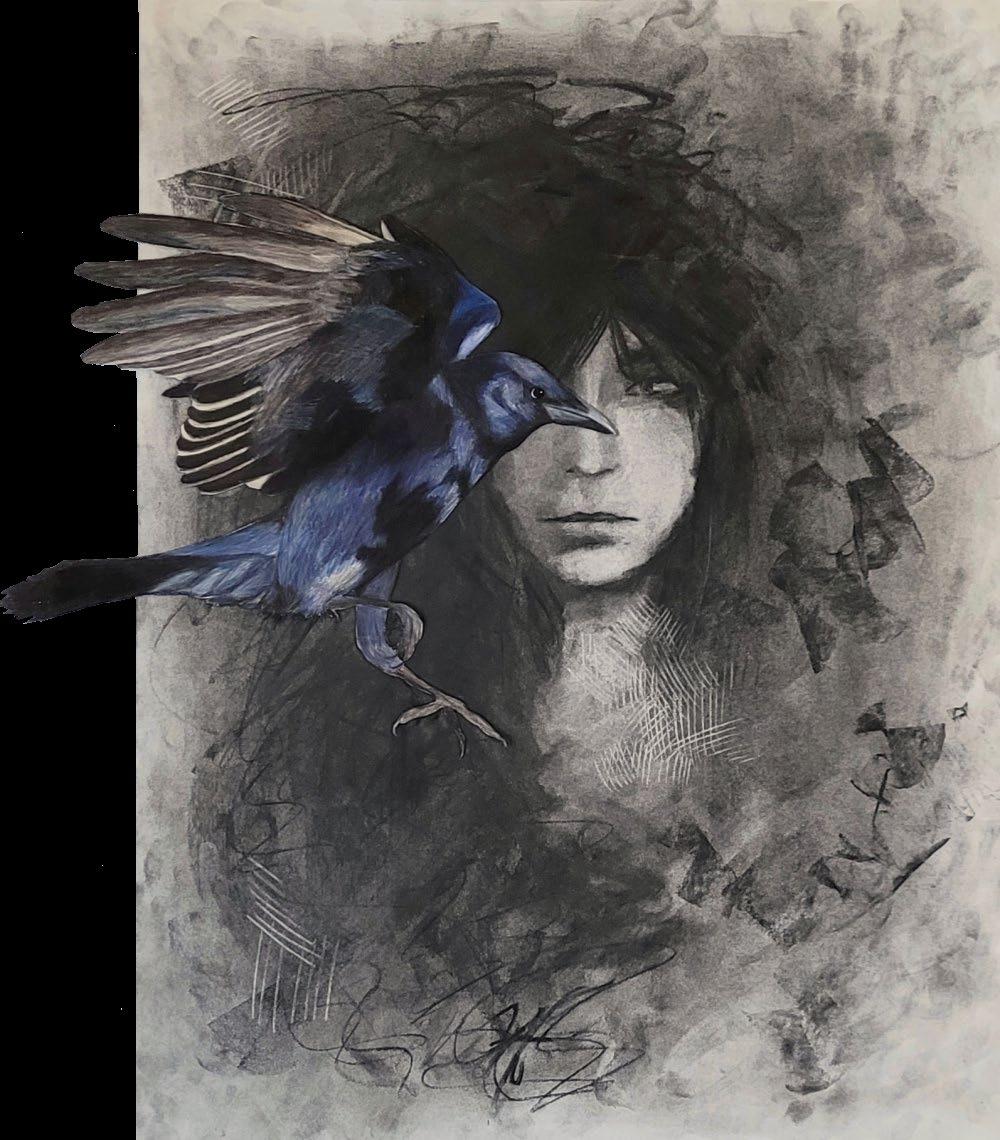
Madelynn Hildebrand ’26, Art Therapy
Transformation
Mud
One can aspire to be like a lotus to grow through the mud, to bloom, untouched. but with great strength comes fatigue. One transforms into a being that can no longer soak up the sun or grow from suffering. instead, one becomes a mangled bug stuck on their back, floating in the mud past the lotus that once was.
Julia Taylor ’13, Studio Art & Education
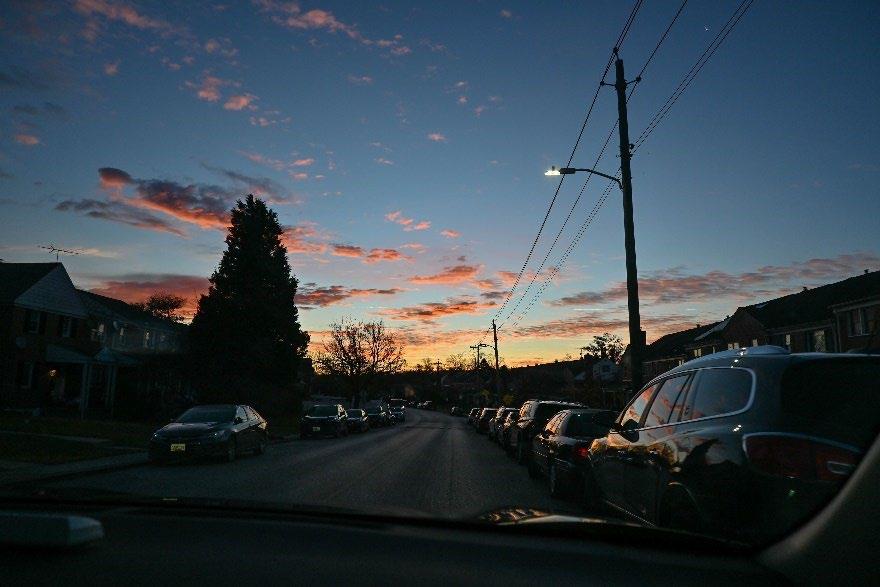
Between Here and There: A Self-Portrait in the Journey
Kritika KC ’25, Biology
The Cord
The cord is thinning
weathered and frayed
Pulling and pulling
When the cord snaps it awakes
As it breaks free from the spirit
A body dismantled to shreds
They say that we should fear it
Piece by piece they collect
The cord is hanging, pulled apart, the threads give in, split in two, no longer whole you question where it begins
Spirit Jones ’28, Nursing

Clear Void
Summara Abaid ’17, Biology
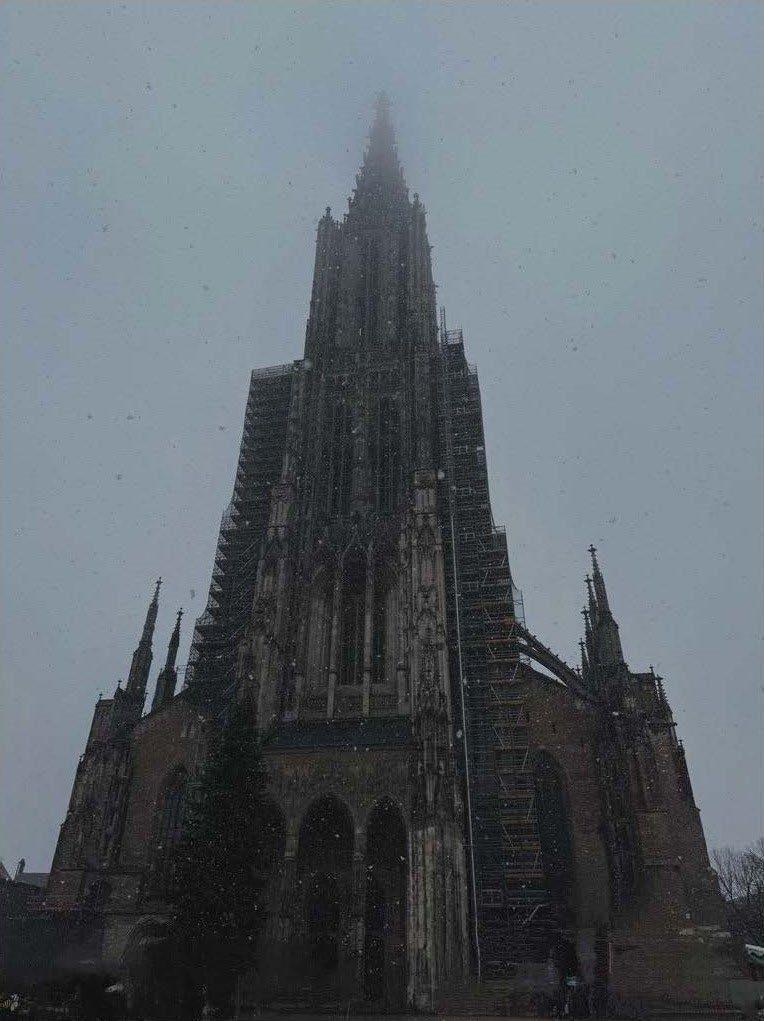
Carter Nocca ’28, Health Sciences
Judgment
Balding stranger wearing flowing robe
His voice like scratching woodconfess your sins
Slats above obliterate path to God
Ragged golden curtain blocking brilliancy
Whirring fans eradicating monotonous silence
Engulfing air like a humid rainforest
Can't breathe in confinement like a savage animal
Father, forgive me...
Jeannine Stanko ’28, Instructional Leadership for Changing Populations (Ph.D.)
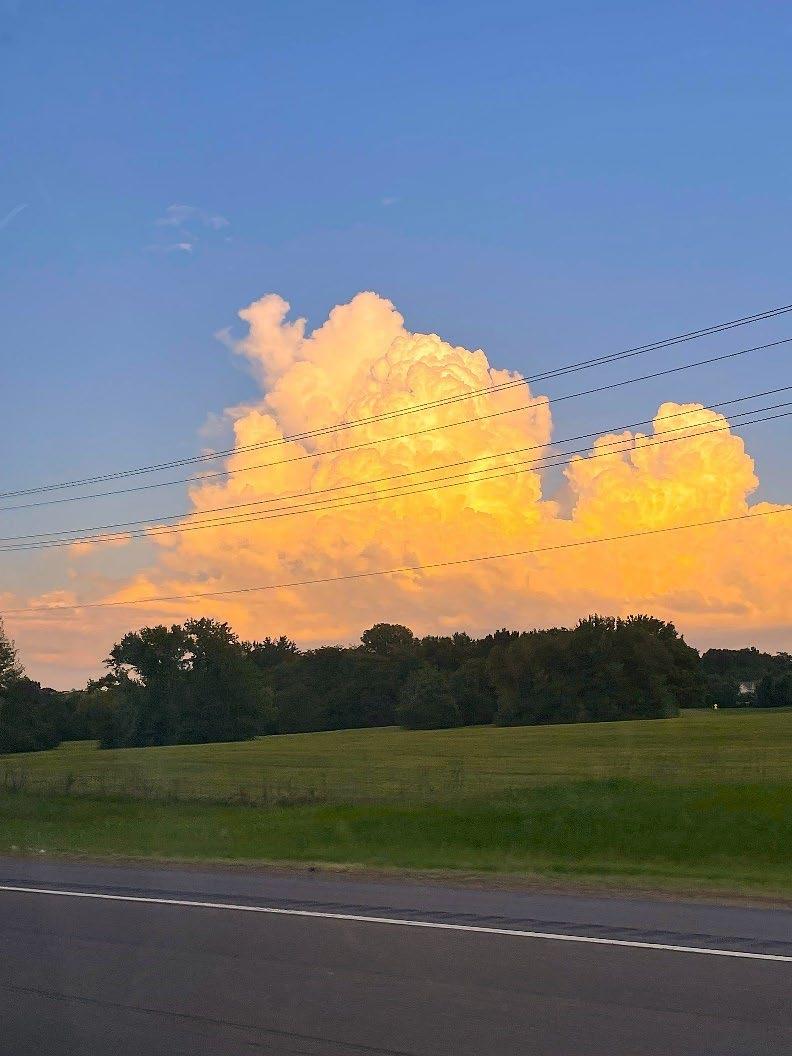
Color Rush
Chelsea Martin ’25, English
A Broken Sonnet 116
Anger is a worm squiggling through a decomposed body stiffly settled in a coffin deep beneath the Earth’s surface
Love alters flaws like smooth heavenly bone as pockmarked skin falls leaving empty eye sockets staring into pitted carved caverns
I squirmed to change myself to “be the star to every wand’ring bark” hell-bent on varying idealized futures
I altered and bent in maintenance of the “ever-fixed mark” but never swayed in honor of vows of honesty
For you, Love will not be Time’s fool in the finalized doom of a slammed lid lost amongst shadows while my heart thumps at impediments
Jeannine Stanko ’28, Instructional Leadership for Changing Populations (Ph.D.)
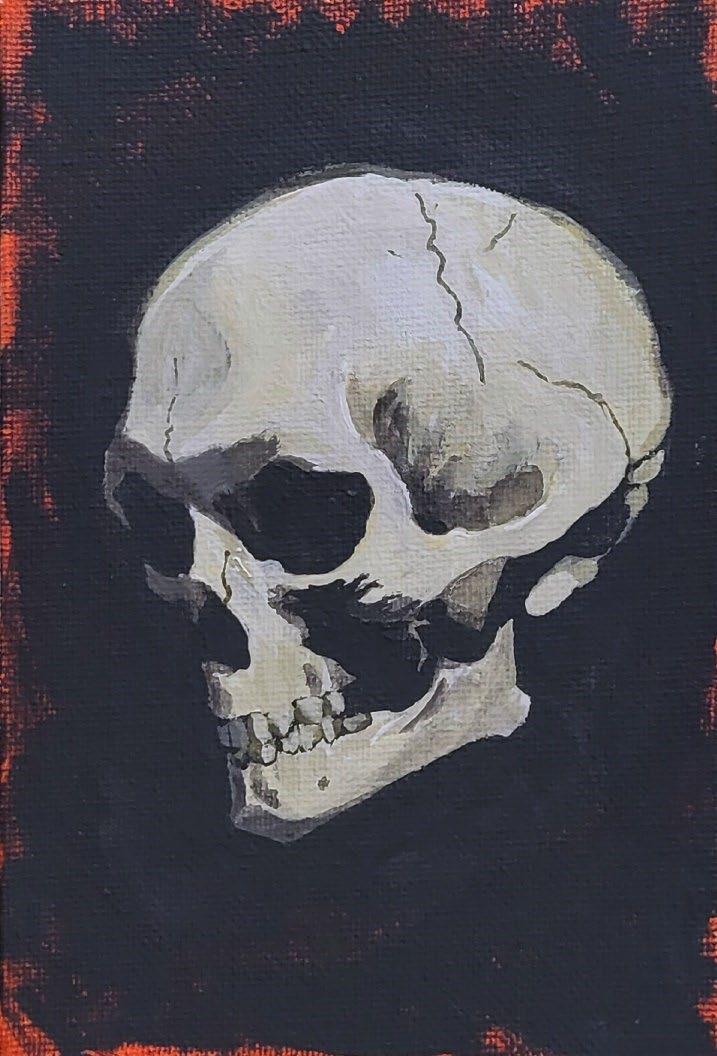
Skull
Madelynn Hildebrand ’26, Art Therapy
Mad Woman
you are no longer recent now just part of the past should revel in the feeling though feelings what you lacked repeated in memories the mind hides the truth the age of innocence tired, and troubled by youth
scorned around the edges I cower in fear this destruction can't be mended it will haunt you through the years
Spirit Jones ’28, Nursing

Enough. Madelynn Hildebrand ’26, Art Therapy
Song Unsung
Oh, my song left unsung, speak of smiles held in ice, of fists clenched young, and hearts laid cold in sacrifice.
Tell of the grieving mother's cries, her child torn from her side, cast to where the nameless lie let not her sorrow hide.
Speak of homes left charred and bare, of childhoods swept away, of dreams that vanished in the air, where safe and sound they’d play.
Cry out, my song, to those above, who claim a rightful throne; let echoes pierce, with truth and love, and sing for those unknown.
Be the balm for wounded souls, a whisper of lasting peace, and tell them beauty’s truest hearts are found where kindness meets.
Sebiha Basar ‘24, Elementary/Early Childhood Education
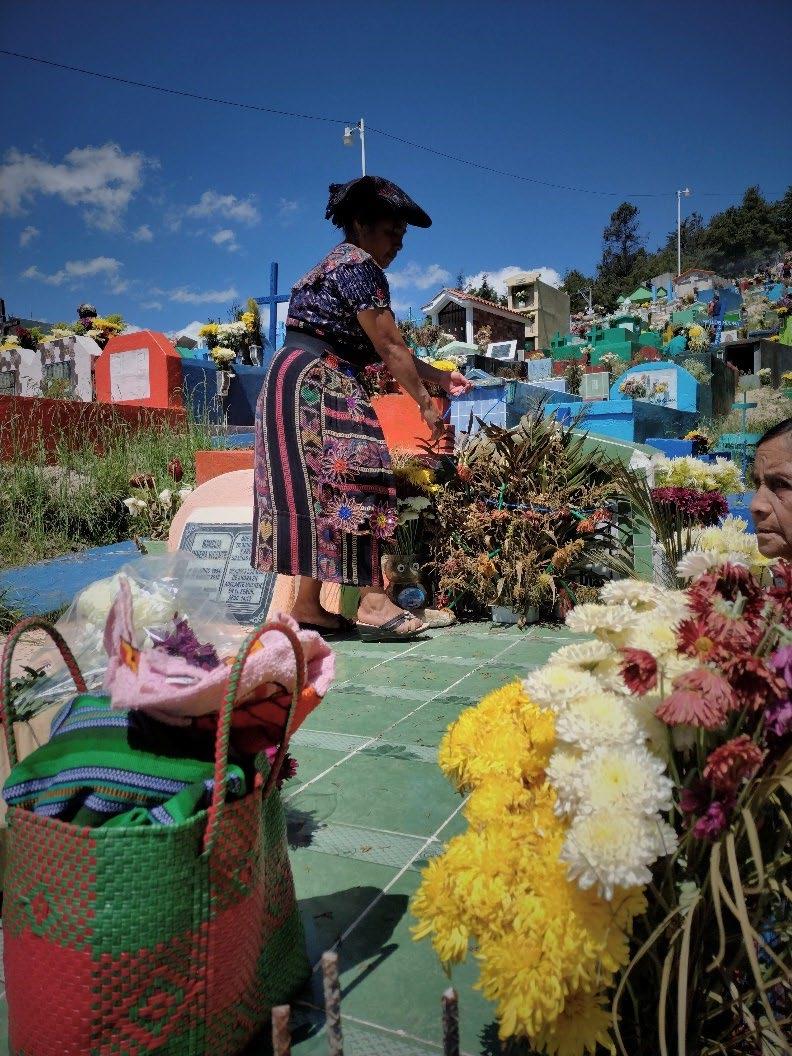
Flowers to Remember
Doris Chavez Mendez ’28, Biology
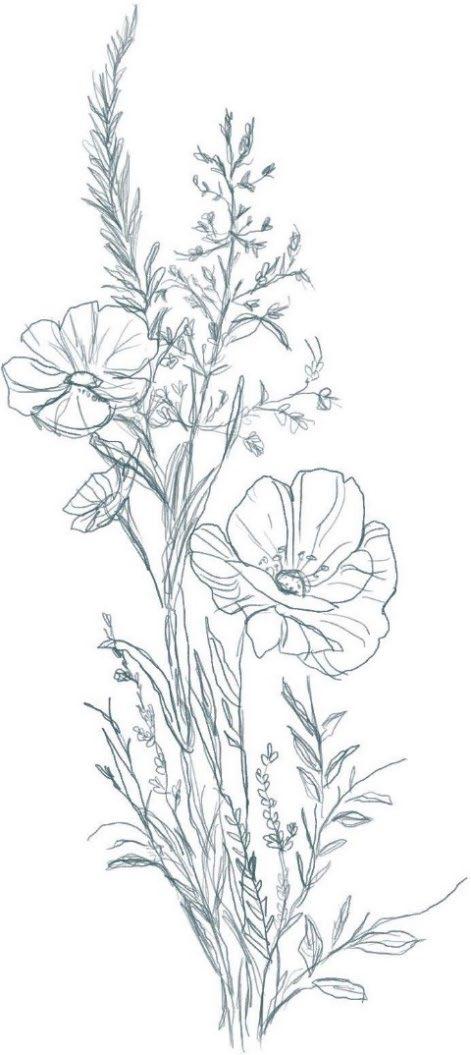
Raechel Bauer ’26, Nursing
The Cost of Healing from Trauma
What is the price of coming home from battles no one else can see?
A heart stitched together with trembling hands, a mind unravelling memory by memory.
The ache begins where words fall silent, deep groans rising where prayers cannot. A storm brews beneath the ribs, waves of despair crashing against the soul, as if drowning beneath a weight unseen.
Alone in the flood, eyes search the sky, no light, no promise. Only the hollow ache until a streak of color bends across the clouds, a whispered covenant: I am here Hope breaks like dawn fragile, distant, but enough to keep breathing.
Healing feels like a garden soil torn open to make room for new life. Good seeds buried beneath layers of sorrow, the Gardener’s hands pressing them deep. Weeds of shame and fear pulled out by their roots, even when they cling tight, refusing to let go.
Some blooms arrive quickly tender shoots breaking through the earth. Others linger, hidden in the darkness, needing more time, more care. Withered branches are pruned, while others outgrow their pots transplanted into wider spaces, where roots stretch and strength returns.
Not every plant survives some never meant for this soil, some planted in the wrong season. But the Gardener tends each one,
witness to every rising bloom, every fallen petal, every rotten root.
The cost is counted in sleepless nights, tears spilled into unseen ground. It’s the weight of therapy bills stacked higher than paychecks. It’s the courage to sit in a circle of strangers to name what once was unspeakable.
In a world where silence is tradition, where pain is labeled taboo, to seek help is to rebel to break chains wrapped tight by generations. Faith whispers beneath the shame: Healing is not a betrayal. It is the greatest act of trust.
“You should be further along by now,” the mirror murmurs in the early light. But even broken things bloom in time. Even cracked pots hold living water.
Just like broken crayons can color again, even a groan can rise like incense a prayer without words, carried by grace.
The cost is steep, the road unmarked, but the Gardener walks the path too every thorn, every storm, every bloom, every sigh, every cry, every mile, step by step, break by break, stride by stride. Every valley, every mountain, every plain, every loss, every grief, every denial, push by push, hope by hope, piece by piece.
Every fight, every crush, every anger, every despair, every surrender, every cycle, breath by breath, death by death, night by night. Until one day, the colors stretch wide a rainbow arched across the wreckage, soft as a promise, strong as a covenant:
I am here. You are not alone.
Keep growing. What was broken will become whole again. What was lost will be found again. What was buried will rise again.
Yvonne Mutshipayi ’25, Instructional Leadership for Changing Populations (Ph.D.)

Untitled
Carter Nocca ’28, Health Sciences

Still Life by Moonlight
Chelsea Martin ’25, English
Dear God, Hear My Cry
Here I am, under the light of the moon, With the cold breeze touching my skin, My eyes facing the sky And my naked feet touching the dirt.
With salty waterfalls bawling from my eyes, Begging to the only friend I have “Take me with You,” I plead Hearing nothing but the whispers of the night “Can you hear me?” I cry, yearning for an answer
God, I plead, I scream, “It hurts,” I say Waiting for his mercy I hear nothing but my own heart beat I feel the touch of death that night. I hear my last breath, my last try, my last sight Wringing a knife in my hand and a rosary on the other I start praying for the salvation of my soul, “Forgive me” I look upon me, and see nothing but the starless sky I feel the knife cold sharp blade steel on my throat Both my hands shaking with hatred, and pain. I looked at the sky one more time, Still no answer. With no fear I press hard. Warm blood, sweet death. Here, take me.
Alisson Suarez ’27, Psychology
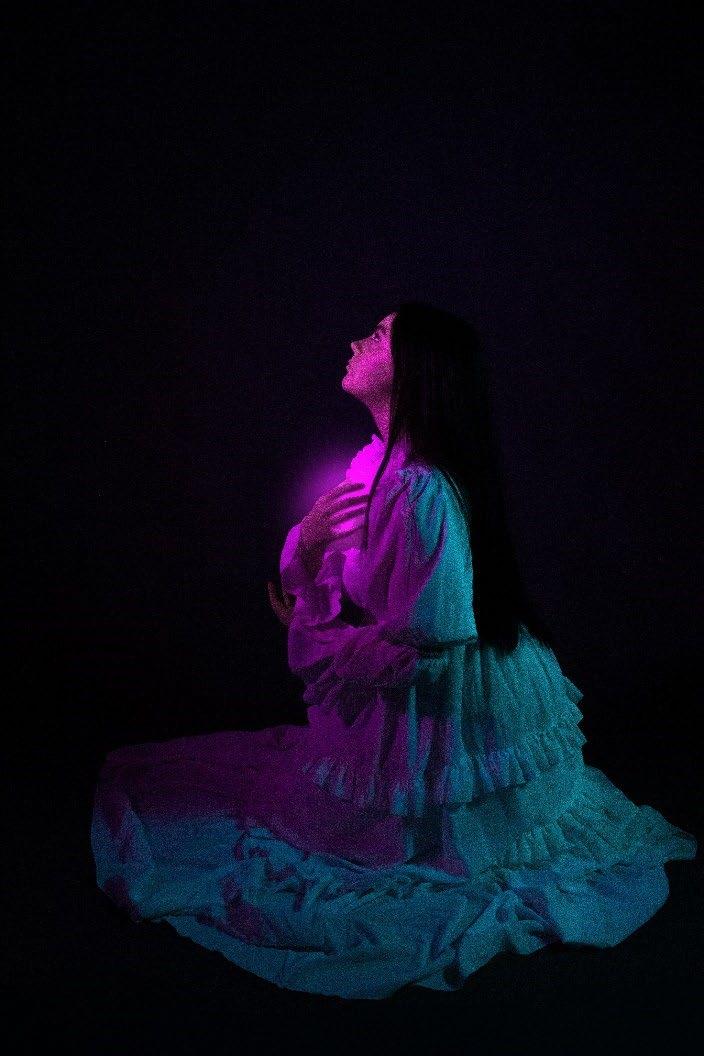
Vulnerability
Madelynn Hildebrand ’26, Art Therapy
A Senioriad
A collaborative poem written by the English professors for the graduating class of 2020 English majors (May 16, 2020).
In Of Amirah, of Katherine, of Katie and of Jessica, Sing Heav'nly Muse! That on that secret top of Gibbons hath inspired Them to write and read and close read metaphors and similes all!
Ne’er a figure of speech escapes their shrewd analytical eyes!
Ne’er a pun, nor pentameter, goes o’erlooked in their graceful prose!
Lo! Is this a literary mag I see before me? And shall
We compare their Damozel to a summer’s day?
Nay, their mag was brighter still and ne’er wanted subject to invent.
But what do we hear? ’Tis time’s wingèd chariot that hurries us
To graduation...Or is it the Gibbons elevator, old or new,
No difference there, one will seize as well as the other?
For days on end no sounds shall they A, or K, or K, or J hear, But moaning voices mouthing “Let us out! We will be good.” Nevermind.
There is no tragedy after the first, and there will be No one there to answer as the sad, still music of humanity
Echoes from the disinfected rooms that once housed their sisters.
Sisters they were. But no spirit like Katie Cardinal alas, (and a lass), She who knew college was hard and all, And mounted those stairs each day
To toil o’er the pathetic scribbling of masses that ate, and slept, And knew her not.
No Amirah Arafat, Well, what of that?
Shall she say she grows old, though The showers of April soak the ideological drought?
And Jessica, she of Delicatessica? The nails she had . . .
Like chrysolite, or purple, black, or orange no rhyme there
For her, just a long table from which she saw the haloed Man one Gene holding forth, or not, depending on The day. No man Friday, he. Her reverie and long sleep through the droning
Challenged only by one Katie Martinez, always seen as
Laughing like those folk on pilgrimages who heard The bawdy tales of that good company, or of Gene— They are a twin birth of raunchy mirth.
Are they gone? Aye, they are gone. Is it ages? Aye, in March they fled, Leaving tomes, poems, stories, dishes, hearts. Two roads diverged in a yellow wood and now we must, As twin compasses, remain here fixed, while they obliquely run. Who can use a compass in these wretched days?
But make no noise, no tear-floods, nor sigh-tempests move! This is a valediction forbidding mourning!
And yet, and yet again, woe is us! Alack, alack, alack! And why, why forbid the morning?
Ah, welladay, but no, that is a mournful sound. Exeunt. The saddest word of all.
Dost thou weep? Touched to the bone, are you? Nay, the pollen strikes mine eye. ‘Tis all.
There will be a time to mourn for them next year, and next year, and Next year! Hardly are those words out when a vast image Out of Zoomus mundi . . . my sight fails me! Strike you the sight of it?!
What? Was it Ovid, or . . . Covid . . .
That sent them there, where by day
The ignorant of other fields did butcher, yea butcher, The noble tongue of the English, high up in The Tower they had come, and the professoriate said, “Save us! We are perishing! The apostrophe!” And the elevated souls brought to heights but ne’er released, murmured, “Help us! We will be good!”
Was it for this that Bossert brought her dolls to class, Or spoke in tongues strange yet melodious?
Did Chaucer and Shakespeare and Spenser— Men who strove with gods speak to her, through her?
Was it for this that Sister Mahoney so happily told the half pence From the pence, and danced to “The Wearing of the Green”
In the high Tower of Gibbons Hall under a green light?
(She said: “I felt a funeral in my brain!”)
Was it for this that Farrington made sense, my God!, if Only that one time? “One time,” said he, so bold, “must for All suffice” And that was all. Henceforth was he not to be known. And was it for this that DelRosso, in her own vision of Once, Wrenched her wrist and twisted fingers and thought and wrote, In letter bold her way of bold that letter: “A.”
And, muses, was it for this that Davis, yes, even he, Did leave his place and step forth and say to them, Knowingly, feelingly, intuitively, pointedly, sagely, “Intelligibilia, non intellectum adfero”? He did wait, There passed a weary time, a weary, weary time, (And Hell is time, for those in the know.)
And hearing nothing, he did slink back into his Corner, mumbling (as he was heard to say), “Pwy fwytaodd y pysgod a’r sglodion?”
In the tongue of the Welsh, that is, But in English, “Who ate the fish and chips?”
A damsel with a dulcimer in a vision I once saw. It was an Abyssinian maid.
“Nay, that’s not right. Two damsels with two dulcimers In two visions you twice saw. And they were English maids both.” Whatever.
“They were Jeana and Kate, And they sang, ‘Go, litel booke,’” Etc.
So, now English maids, you, too, May go. We would have you stay With poor, pitiful us, but your stay, not free, Absents you more. Go, little maids, Damsels, Damozels, each one a poem, And meet the ages with your fiery minds And souls set to chart the courses of Your lives. Kindly pardon the mixing of These metaphors. Thank you. Go forth, transform the world If only by one semicolon at a time. These, too, shall be counted.
We will see your work in generations to come, And we will see with open eyes that you Strove, sought, found, and yielded to no man, For you are Notre Dame women, Strong in purpose. And you majored in English.”
— Kate Bossert, Ph.D.; William Davis, Ph.D.; Jeana DelRosso, Ph.D. ; Gene Farrington, Ph.D.; Margaret Mahoney, SSND, Ph.D.
A Post-Senioriad
A collaborative response to “A Senioriad” written by the graduating class of 2020 English majors.
On the heights of Caroline Hall nay, we know it not by that name On the top of Gibbons, where the tower loomed above, We gathered, small but fierce, To toil in letters, to dream in prose, to breathe in verse, And to learn, with ink-stained hands, the weight of words. O mighty hall, whose walls heard our echoes, Who held our laughter and late-night lamentations, Our refuge and our forge, where we sharpened wit And tempered thought in fires of criticism and rhyme.
Professors, mentors, friends dear ones, And none like Bossert, who spoke in tongues Middle English lilted, Faustus at her lips, Paradise Lost in her heart.
She who bore the permit for Time’s chariot (or Notre Dame’s bus?), Guiding us not to ruin but to rare books and rarer days.
O, to strike another bargain! To sell our souls for one more hour In the halls where Gawain strode and Chaucer jested!
Yet, the deal was struck; the ink long dried, Left with a photograph of our beloved seminar room, given at our parting.
And DelRosso, of Unruly Catholic Women and Margaret Atwood’s might, Her curly locks bouncing as she wove tales of research woes And MLA’s cruel, unbending rules. She led us through the postcolonial mist, Through dystopian worlds, Urging us, coaxing us to share our research, Through many courses, trials, and journeys, Yet we emerged, citing properly at last!
Oh, Sister Mahoney, our guardian of syntax, of commas and clarity, Who kept watch o’er the Writing Center for a time, where our weary souls
Found refuge in red ink and whispered revisions. In her class, where Jess met Amirah, where papers met polish,
Where Poe met Irving met Dickinson met Hawthorne, Where, perhaps, a spirit or two (of the literary kind) lingered long past dusk.
And dear Farrington no, we call him Gene whose favorite words we dare not utter here,
A uniform of black, a flash of purple ‘round his throat, The Blue Heron’s call still ringing in our ears, (“Are you coming on the London trip?” sounding just as loudly), He who scorned tears rolling down cheeks (where else would they go?),
Who deemed sci-fi unworthy, yet granted us the grace of stories and English tea,
Who never had a chance to give us our final senior dinner, But left us crumbs of wisdom, scattered like pirated DVDs.
Ah, and Davis, with the flip phone of yore, Who measured out his life with coffee spoons and Bartlett pears, Who spoke of Victorian fallen women and England’s (only recent) discovery of salt, Whose couch bore witness to our sighs and literary woes
Can you imagine if there had been yellow wallpaper? He who pondered a mighty combover his own words, to be sure, Who once told us, “Be brilliant, creative, and wise.”
And so we strive to be, searching for meaning in margins and texts.
What shook us from our coveted seminar room chairs?
'Twas not time’s wingèd chariot, but a call "Exit, pursued by Covid!"
March came (two days short of the ides; we had not yet thought to beware),
Torn from the tower, cast from our seats, Scattered like wind-blown leaves, yet rooted still.
Of Jessica, with nails of alexandrite, Now clad in colors fit for teaching, Brings forth the lessons once bestowed, Guiding young minds through their early days.
Dear Katherine, who treads the boards once more, A daughter of drama, a maker of magic, Breathes life to scripts and stories untold,
A playwright in purpose and passion.
Our Amirah, once undecided, now resolved, Passing on knowledge, carrying forth light, No longer just scholar but shaper of minds, A torchbearer in halls anew.
And for Katie, still she climbs, To toil o'er Damozel’s pages, To shape and craft, to stitch and mend, A keeper of words, a weaver of dreams.
O Professors, we return to you now, Converging where roads once diverged, No longer students, yet ever your scholars. Yes, we majored in English, One semicolon at a time how else?
For you are Notre Dame professors, Equally strong in purpose, steadfast in verse, And you taught us English.
Amirah Arafat ’20, English; Katie Cardinal ’20, English & Environmental Sustainability; Katherine Martinez ’20, English & Spanish; Jessica Profili o’20, English
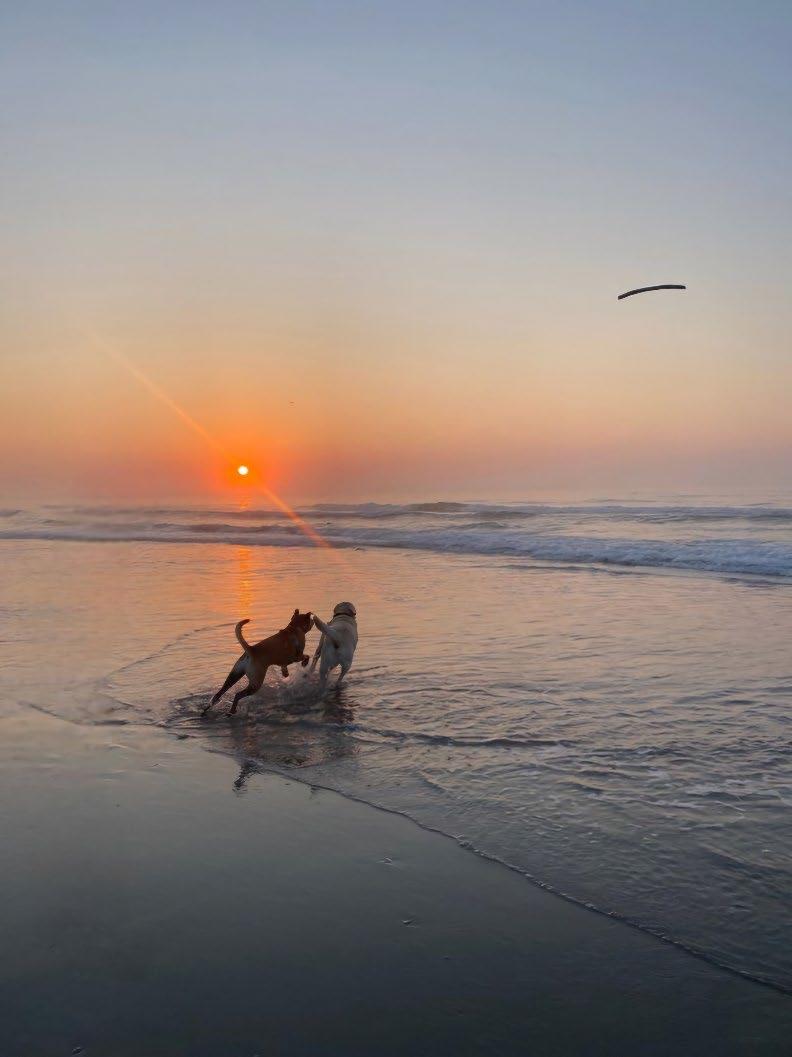
Fetch in the Ocean
Holly Hand ’25, English Cover

NOTRE DAME OF MARYLAND UNIVERSITY
